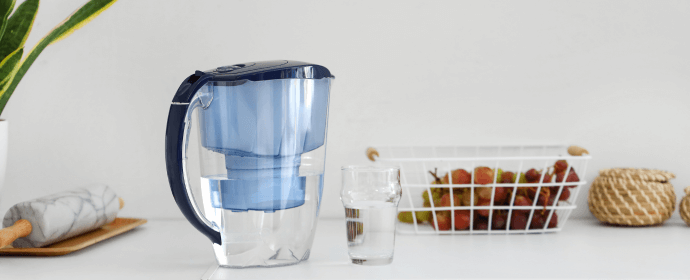When you pour water into a glass, do you ever notice that it looks cloudy or has strange white spots? Yes, that is the less glamorous side of hard water. And if you’re like me, you might wonder if a handy Brita filter can protect your water from these horrible minerals. Warning: the ending isn’t quite a fairy tale, but there’s more to the story than meets the imagination (or your taste buds).
So, does Brita really soften water? We’re about to go into great detail about hard water, Brita’s filter magic, and whether it can save your water. The science behind temporary vs. permanent hardness will be explained, and the pros and cons of Brita filters will be looked at to determine if they are the best solution for your water problems. Soon, you’ll be able to talk about water like a pro, knowing how to pick the best mineral for your needs and leaving mineral secrets behind!
Understanding Hard Water: The Hidden Foe
Hard water contains a large quantity of minerals, such as calcium and magnesium, which causes a variety of challenges. Hard water has an impact on everything from stubborn soap scum and filmy dishes to scale accumulation in appliances and dingy clothing. However, not all are made equal.
Hardness comes in two varieties:
- Temporary Hardness: Caused by calcium bicarbonate, which can create limescale but dissolves easily when boiled or heated.
- Permanent hardness is caused by calcium sulfate, which remains undissolved even when heated and necessitates stronger treatments to address.
- Brita: The Filtering Friend, But Not Quite a Softener
Now we come to our story’s hero (or perhaps sidekick): the Brita filter. These compact pitchers are known for eliminating pollutants such as chlorine and lead from your water, increasing its taste and clarity. Can they soften it as well?
The answer is partly yes.
Brita filters generally treat transient hardness. Their activated carbon and ion exchange resins trap calcium bicarbonate, lowering its concentration and resulting in limescale buildup. However, they are ineffective at removing permanent hardness because calcium sulfate is unaffected by their filtration process.
So what does this mean for you?

Does this suggest that Brita filters are ineffective against hard water? Not exactly. Even if they won’t do wonders for the water’s long-term hardness, they can make it taste better and clearer. A Brita filter could be a good first step if taste and small amounts of limescale buildup are the major things that bother you. However, a dedicated water softener system may be a better alternative for extreme hard water issues that impair appliances or cause significant scale.
On the other hand, a dedicated water softener system may be a better solution for extreme hard water problems that harm appliances or cause significant scaling.
Making the Right Choice: Brita vs. Water Softener
Ultimately, the decision is based on your own demands and preferences.
Consider the following:.
- Taste: If your main issue is taste and a minor improvement in clarity, Brita can help.
- Limescale: If you have mild limescale buildup, Brita could help.
- The severity of hard water: A water softener is a solution for severe hard water problems that are affecting appliances or producing significant scale buildup.
- Budget: Brita filters are less expensive than water softeners, which require installation and continuous maintenance.
Does filtering hard water make it soft?
Not all filters are created equally! Brita filters improve taste and clarity by removing transitory hardness (calcium bicarbonate) but do not address permanent hardness (calcium sulfate). Dedicated water softener systems are recommended for comprehensive softening.
Is Brita’s filtered water hydrating?
:max_bytes(150000):strip_icc()/GettyImages-1451734103-d7d16987a08249b6b5114ce1a36aad41.jpg)
Absolutely! Brita prevents pollutants such as chlorine and lead from entering your water, making it cleaner and more enticing to drink, potentially leading to improved hydration.
What kind of filter softens water?
Water softener systems commonly employ ion exchange resins. These collect hard minerals and replace them with sodium or potassium, “softening” the water.
Is a Brita filter worth it?
It depends! If you’re concerned with taste and tiny-scale building, a Brita filter is affordable. For severe hard water problems, a water softener provides a more thorough solution.
Water softener or water filter: which is better?
There is no apparent winner! It comes down to your requirements. Water softeners remove all hardness; however, they might affect taste and require maintenance. Water filters such as Brita improve taste and remove pollutants but do not completely soften water.
Can I drink softened water?
Yes! While there are worries regarding the sodium level of some softeners, research shows that modest intake is often harmless. Consult your doctor for personalized advice, particularly if you have a medical problem.
What softens hard water naturally?
Several natural techniques exist; however, their efficiency varies. Boiling can alleviate transient hardness, although white vinegar or baking soda can remove minor scale buildup. However, these methods are less reliable than filtering or softening systems.
Can you soften water without salt?
Yes! Salt-free water softeners employ potassium chloride instead of sodium chloride. They are an excellent choice for persons on sodium-restricted diets, although they may be less efficient than regular softeners and require more frequent regeneration.
What is the most often used water softener?
The most common type of water softener is ion exchange, which uses either salt or potassium chloride. Other alternatives include reverse osmosis systems and magnetic water softeners, each with benefits and drawbacks.
How do you make water soft without a water softener?
While not “softening” in the real sense, boiling or utilizing filters like Brita can help with some hard water problems. Additionally, altering appliance settings for hot water and using less detergent might reduce its impact.
Is Brita cheaper than buying water?
Generally, yeah! A Brita filter is a reusable and affordable alternative to bottled water, lowering costs and plastic waste.
How does Brita water taste?
The flavor of Brita filtered water is subjective. Some people find it sweeter or cleaner because of the removal of chlorine and other contaminants. Ultimately, taste choice is subjective!
What is the pH of hard water?
Hard water often has a higher pH than soft water, ranging between 7.1 and 8.5. However, pH alone does not determine “hardness” and should not be regarded as the only indicator.
Now, you can confidently navigate the world of hard water! Remember that the optimal solution is based on your demands and preferences. So, study and choose the strategy to keep your water clear, your appliances pleased, and your thirst satiated!
So the answer to the question “Does Brita soften water?” is complicated. It can remove transient hardness, improve taste, and reduce small-scale buildup. However, a specialist water softener is the hero you need for extremely hard water issues.
Finally, the decision is based on your priorities and water challenges. Brita could be your knight in shining armor if you’re concerned about taste and minor limescale. A water softener will use a larger sword to provide comprehensive softening and appliance protection.


Leave a Reply